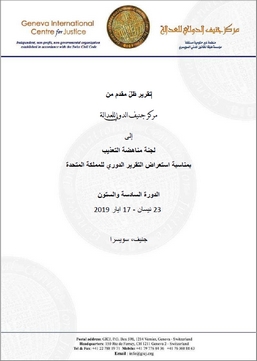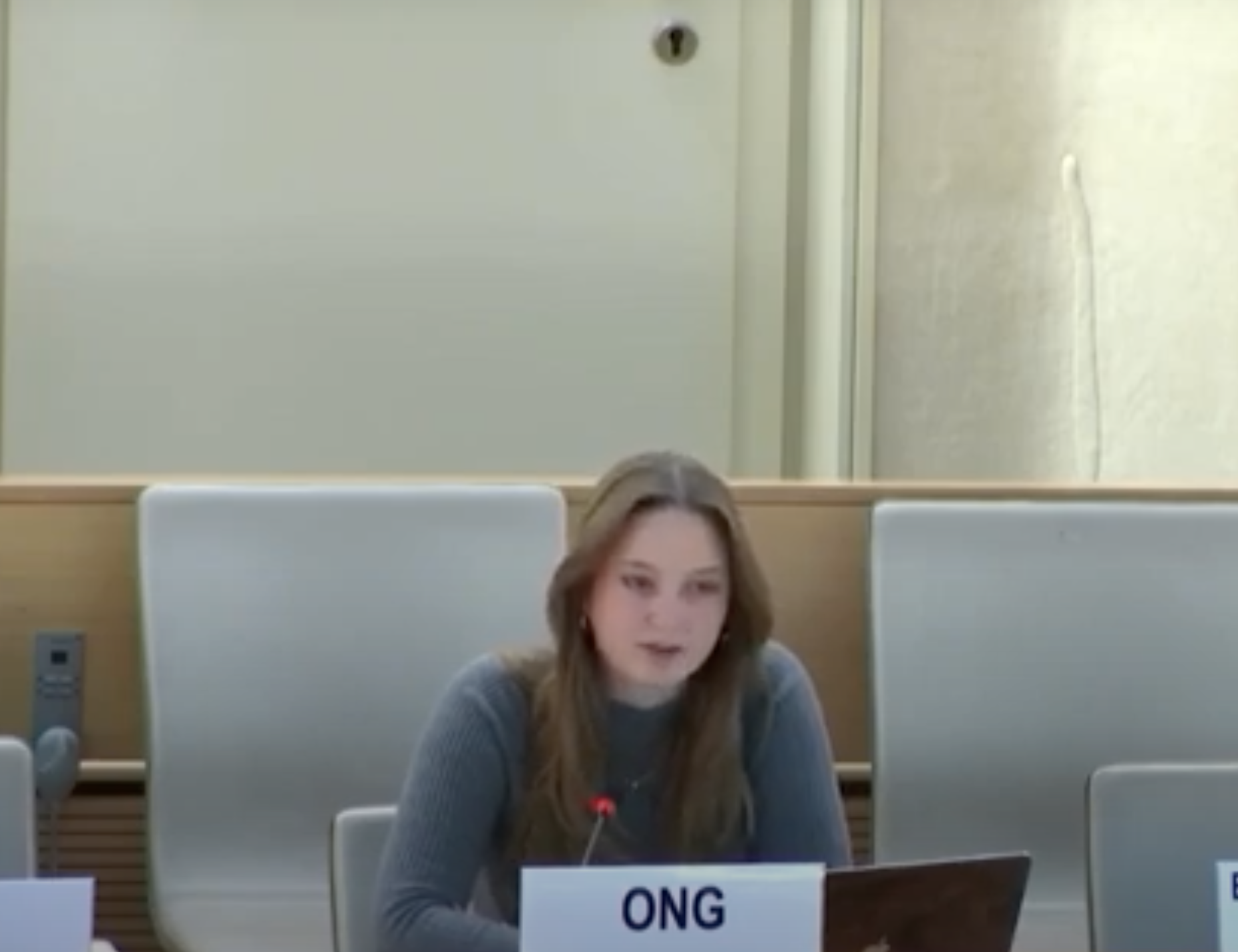From Geneva International Centre for Justice (GICJ)
GICJ denounces torture and ill-treatment committed by the UK military forces in Iraq
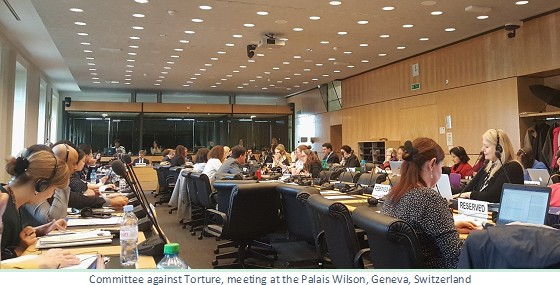
CAT urged the UK to ensure accountability by establishing public inquiry mechanisms
On the occasion of the 66th session of the Committee against Torture (CAT) during May 2019, Geneva International Centre for Justice (GICJ) contributed to a review on torture and ill-treatment of detainees held overseas by the military forces of the United Kingdom (UK) and met with members of the Committee to discuss several areas of concern. GICJ urged the UK to carry out a full inquiry into alleged acts of torture and other ill-treatment committed by, at the instigation of, or with the consent or acquiescence of, British officials.
In a written report to CAT, GICJ explained that the United Kingdom was part of the US-led coalition that illegally invaded Iraq in March 2003. Following the invasion and subsequent occupation involving UK military forces, UK forces remained in Iraq at the request of the new Iraqi government in 2004 until their complete withdrawal in May 2011. While in Iraq, UK forces operated several detention centres where many detainees suffered torture, inhumane treatment, sexual violence and other ill treatment at the hands of UK military personnel. Some detainees died as a result.
GICJ pointed out that after more than a decade, the UK government still has not resolved the allegations of torture and mistreatment. After numerous inquiries, changing bureaucratic arrangements and political interference, the victims of torture and mistreatment, and their families, still have not received justice.
On 17 May 2019, CAT issued its concluding observations for the UK, which contained the following recommendations:
- The UK should take effective measures to prevent acts of torture not only in its sovereign territory but also in all areas where it exercises effective control.
- The UK should take all necessary measures to establish responsibility and ensure accountability for any torture and ill-treatment committed by UK personnel in Iraq, specifically by establishing a single, independent, public inquiry to investigate allegations of such conduct.
- The UK should, without delay, establish an inquiry into allegations of complicity in torture overseas, especially considering the disturbing findings of a 2018 parliamentary report on detainee mistreatment and rendition.
GICJ stresses the need for timely resolution of the allegations of torture against UK military personnel. GICJ will keep track of progress made in ongoing investigations by the International Criminal Court and persevere in its efforts to deliver justice to the victims of torture in Iraq.
Key Words: Human Rights, Torture, UK, CAT
Country / Region: UK – Europe
From Geneva International Centre for Justice (GICJ)
GICJ denounces torture and ill-treatment committed by the UK military forces in Iraq

CAT urged the UK to ensure accountability by establishing public inquiry mechanisms
On the occasion of the 66th session of the Committee against Torture (CAT) during May 2019, Geneva International Centre for Justice (GICJ) contributed to a review on torture and ill-treatment of detainees held overseas by the military forces of the United Kingdom (UK) and met with members of the Committee to discuss several areas of concern. GICJ urged the UK to carry out a full inquiry into alleged acts of torture and other ill-treatment committed by, at the instigation of, or with the consent or acquiescence of, British officials.
In a written report to CAT, GICJ explained that the United Kingdom was part of the US-led coalition that illegally invaded Iraq in March 2003. Following the invasion and subsequent occupation involving UK military forces, UK forces remained in Iraq at the request of the new Iraqi government in 2004 until their complete withdrawal in May 2011. While in Iraq, UK forces operated several detention centres where many detainees suffered torture, inhumane treatment, sexual violence and other ill treatment at the hands of UK military personnel. Some detainees died as a result.
GICJ pointed out that after more than a decade, the UK government still has not resolved the allegations of torture and mistreatment. After numerous inquiries, changing bureaucratic arrangements and political interference, the victims of torture and mistreatment, and their families, still have not received justice.
On 17 May 2019, CAT issued its concluding observations for the UK, which contained the following recommendations:
- The UK should take effective measures to prevent acts of torture not only in its sovereign territory but also in all areas where it exercises effective control.
- The UK should take all necessary measures to establish responsibility and ensure accountability for any torture and ill-treatment committed by UK personnel in Iraq, specifically by establishing a single, independent, public inquiry to investigate allegations of such conduct.
- The UK should, without delay, establish an inquiry into allegations of complicity in torture overseas, especially considering the disturbing findings of a 2018 parliamentary report on detainee mistreatment and rendition.
GICJ stresses the need for timely resolution of the allegations of torture against UK military personnel. GICJ will keep track of progress made in ongoing investigations by the International Criminal Court and persevere in its efforts to deliver justice to the victims of torture in Iraq.
Key Words: Human Rights, Torture, UK, CAT
Country / Region: UK – Europe
Read this full article
Committee Against Torture
Consideration of the United Kingdom
May 2019
Introduction
The United Nations Committee Against Torture considered the sixth periodic report of the United Kingdom of Great Britain and Northern Ireland (CAT/C/GBR/6) at its 66th session, held from 23 April to 17 May 2019.

The Committee Against Torture is the body of 10 independent experts that monitors implementation of the Convention against Torture and Other Cruel, Inhuman or Degrading Treatment or Punishment by its State parties. All States parties are obliged to submit regular reports to the Committee on how the rights are being implemented. States must report initially one year after acceding to the Convention and then every four years. The Committee examines each report and addresses its concerns and recommendations to the State party in the form of concluding observations.
GICJ Participation
Geneva International Centre for Justice (GICJ) participated in the review of the United Kingdom by submitting a shadow report and gave a presentation at the meeting with the Committee on 6 May 2019. In its presentation to the Committee, GICJ summarized its shadow report focusing on torture and ill-treatment committed by the military forces of the United Kingdom (UK) during the military occupation of Iraq. GICJ expressed its grave concern over the lengthy time the UK is taking to address these cases of torture and other abuse, the effectiveness of investigation and prosecution of all such allegations, including commensurate sanctions for those responsible and adequate reparation for victims.
Background
In its report, GICJ explained that the United Kingdom was part of the US-led coalition that illegally invaded Iraq in March 2003. The invasion was followed by an occupation involving UK military forces. Although the involvement of the UK in the occupation officially ended in June 2004 with a new interim government taking power in Iraq, UK forces remained in Iraq at the request of the new Iraqi government until their complete withdrawal in May 2011.
In 2009, the UK government established an inquiry (officially called “The Iraq Inquiry”) to examine the circumstances of the UK’s participation in the invasion and its subsequent role in the occupation of Iraq. Regarding the decision to invade, the inquiry concluded that “the circumstances in which it was decided that there was a legal basis for UK military action were far from satisfactory.” The inquiry chairman said that the basis of Prime Minister Tony Blair’s decision was “not clear” and involved “flawed intelligence and assessments” that “were not challenged, and they should have been.” The inquiry also determined that the UK “failed to take account of the magnitude of the task of stabilising, administering and reconstructing Iraq” and that its “effort in post-conflict Iraq never matched the scale of the challenge.” The UK went into the Iraq invasion without sufficient resources and became primarily focused on pulling its forces out of Iraq as soon as possible.[1]
While UK forces were in Iraq, they operated several detention centres. Many of the detainees in UK custody suffered torture, inhumane treatment, sexual violence and other ill treatment at the hands of UK military personnel. Some detainees died as a result of their mistreatment or were simply killed by the soldiers. In one case that is currently being litigated, a detainee was beaten unconscious, locked naked in a solitary cell with rats, and repeatedly force-fed when he when on a hunger strike. He was kept in the dark for over two years.[2] Another such case was Baha Mousa who died after being severely beaten at an interrogation facility.[3] An inquiry into Baha Mousa’s death discovered that military personnel were using prohibited interrogation techniques that amount to torture. These and other cases led to a ruling by the British High Court that British troops and the Ministry of Defence breached the Geneva conventions in the way they handled detained civilians.[4] The Prosecutor of the International Criminal Court (ICC) has documented at least seven deaths at the hands of UK military personnel in Iraq.[5]
Justice for Iraqi Victims of Torture
GICJ raised its concern about the lengthy time the UK is taking to address these cases of torture and other abuse of Iraqi citizens by British military personnel following the 2003 invasion. Article 7(2) of the Convention specifies that, while guaranteeing fair treatment of the accused, the prosecution of allegations of torture by a State shall be conducted “in the same manner as in the case of any ordinary offence of a serious nature under the law of that State.” We question whether the many different special entities and procedures that have been used for addressing these cases comply with this obligation. We note the ongoing assessment by the ICC Prosecutor as to whether the UK processes are truly genuine or whether their conduct is delaying justice and making prosecution of the crime more difficult.[6] We urge the Committee to press the UK delegation on this matter and request that the UK government ensure that evidence and witnesses are protected.
The State Party report makes specific reference to the discrediting of many allegations due to the professional misconduct of a prominent solicitor.[7] Such professional misconduct is concerning because it diverts attention away from legitimate claims and may give rise to political backlash. We are concerned that this may result in the government disregarding or discrediting remaining credible allegations. We urge the Committee to help ensure this does not happen. Regardless of the misconduct of one solicitor, the State Party remains obligated to continue with proper investigation and prosecution of all remaining allegations.
GICJ made it clear in its submission that it supports the Committee’s previous concluding observations to the UK in 2013 pointing out the UK’s failure to truly examine the systemic nature of torture, including the role of military and political leaders. Although the UK has conducted a few public inquiries into high-profile cases of abuse by military personnel, the Committee expressed concern about the UK’s “resist[ance to] a full public inquiry that would assess the extent of torture…and establish possible command responsibility for senior political and military figures.” In addition, the Committee noted with deep concern that there had been “no criminal prosecutions for torture or complicity in torture involving State’s officials, members of the security services of military personnel” in spite of there having been a number of court-martials of soldiers for abusing Iraqi civilians.[8] GICJ also shares the Committee’s deep concern about the lack of appropriate penalties for torture or inhumane treatment.[9]
GICJ also highlighted the Committee’s call that all victims “obtain redress and are provided with effective remedy and reparation.”[10] Through remedy and reparation the victims of torture and other abuses will finally receive justice. We cannot stress enough the importance of moving forward with the investigations expeditiously in order to help the victims and their families begin rebuilding their lives.
Interactive Dialogue with the Committee Against Torture
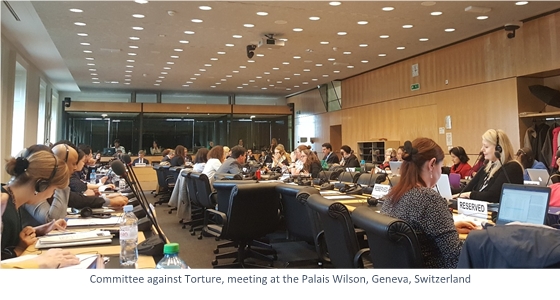
On 7 May 2019 (CAT/C/SR.1740), the review started with a presentation of the sixth UK periodic report by the UK delegation in accordance with the optional reporting procedure. This was followed by commentaries and questions regarding a variety of issues related to the UK report and its implementation of the Convention raised mainly by the two country rapporteurs and, secondarily, by other members of the Committee. The UK delegation was given 24 hours to prepare for the interactive dialogue with the Committee by providing replies to and elucidations of the issues raised the previous day. On 8 May 2019 (CAT/C/SR.1743), the UK delegation provided answers and clarifications related to a broad range of issues raised the day before and the same day by the Committee. After having informed the UK delegation of the possibility to send additional relevant information within 48 hours, the Chair of the Committee stated that the concluding observations would be transmitted to the State party on 16 May 2019, one day before being publicly released. The Chair further drew the Delegation’s attention to the fact that the concluding observations include a set of recommendations, among which some urgent recommendations implementable within one year’s time would be selected for the follow-up. In this respect, the State Party is required to provide details about their implementation within one year’s time. Within the same time frame, the State party is invited to inform the Committee about its plans for implementing all the recommendations included in the concluding observations. After commending the UK Delegation’s participation and engagement in the dialogue with the Committee Against Torture, the Chair declared the session closed.
Questions raised by the Members of the Committee Against Torture
The Committee further expressed its concern over the government’s statement about the extraterritorial application of the Convention and that of other regional and international human rights instruments. The State party’s very narrow view is detrimental to the protection of rights and, along with what has been said by civil society, it reveals a clear intention to protect British troops from accusations of human rights violations. The subsections 4 and 5 of the criminal justice act allowing for the application of lower standards outside the UK should be repealed as they are inconsistent with relevant provisions of the Convention. In considering the territorial application of human rights law, the UK must accept its international law obligations pursuant to the Convention are extended to operations of British forces overseas and over foreign nationals that fall within the scope of UK jurisdiction.
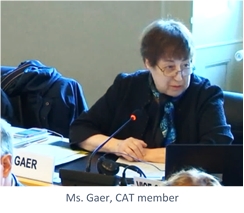 On the Iraqi Historical Investigation Team, the Committee stated that it was dissolved in 2017 and replaced by the Service Police Legacy Investigations, the mandate being to complete investigations on complaints against abuses committed by the British forces between 2003 and 2008. Given the fact that the mechanism has close links with the Ministry of Defence, this can call into question its independence. The Committee would appreciate information on whether any ongoing legal process has been started as a result of its work or the work of its predecessors. During the occupation of Iraq, UK forces ran many detention centres where prisoners suffered torture, inhuman treatment, sexual violence and other ill-treatment at the hands of military staff. Many detainees died as a result of ill-treatment or were executed. One example was the case of Mr. Baha Mousa, who died after interrogation during which he was severely struck. In his case, the investigation showed that interrogation techniques equivalent to torture had been used. In other cases brought before the UK Supreme Court, it was handed down that the Ministry of Defence and British troops had violated the Geneva Conventions because of the way in which they had treated detained civilians. In its report, the UK stated the continuity of effective mechanisms under which the security intelligence agencies can be held to account in the UK, and this includes the investigatory powers tribunal and the intelligence and security committee. The first is an independent court that decides on claims or complaints made about unlawful intrusion by public bodies, can order that activities stop, can quash authorizations, etc.
On the Iraqi Historical Investigation Team, the Committee stated that it was dissolved in 2017 and replaced by the Service Police Legacy Investigations, the mandate being to complete investigations on complaints against abuses committed by the British forces between 2003 and 2008. Given the fact that the mechanism has close links with the Ministry of Defence, this can call into question its independence. The Committee would appreciate information on whether any ongoing legal process has been started as a result of its work or the work of its predecessors. During the occupation of Iraq, UK forces ran many detention centres where prisoners suffered torture, inhuman treatment, sexual violence and other ill-treatment at the hands of military staff. Many detainees died as a result of ill-treatment or were executed. One example was the case of Mr. Baha Mousa, who died after interrogation during which he was severely struck. In his case, the investigation showed that interrogation techniques equivalent to torture had been used. In other cases brought before the UK Supreme Court, it was handed down that the Ministry of Defence and British troops had violated the Geneva Conventions because of the way in which they had treated detained civilians. In its report, the UK stated the continuity of effective mechanisms under which the security intelligence agencies can be held to account in the UK, and this includes the investigatory powers tribunal and the intelligence and security committee. The first is an independent court that decides on claims or complaints made about unlawful intrusion by public bodies, can order that activities stop, can quash authorizations, etc.
As regards the treatment of detainees abroad, the Committee mentioned that the Parliamentary Committee carries out constant work. It receives written responses from the UK government to the issues identified, and the government asserted it fully cooperated with police investigations, most notably on detainees. On the case of Mr. Aamer, a British resident detained in Guantanamo since 2002, released in 2015, it was alleged he was tortured in prison by UK officials in Afghanistan in 2001. The UK said in the report the issue was being investigated and that it was awaiting the report on the outcome of the inquiry. The Committee questioned whether the UK Government received such a document and if so, the conclusions of the Parliamentary Committee would be shared with the Committee.
According to the Committee, from the State Party’s report it can be inferred that the UK Government has a long-standing policy of neither confirming nor denying the involvement of UK special forces in particular operations in Iraq, and there is no distinction made between ordinary forces and special forces when it comes to special service police investigations. With regard to torture and ill-treatment, several UN treaty bodies in 2017 expressed their concern about the lack of information on the investigations carried out when it came to alleged renditions by UK forces and people under UK custody, secret prisons in the international airport of Baghdad, which would be grave violations of international law. 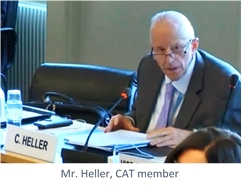 As regards the Al-Sweady case, in the State Party’s report, it is stated that the final report of the inquiry published in 2014, the chairman concluded that of all those killed or captured on the 14 May 2004 were actually involved in ambushes on British forces, and that no one was killed or tortured while in British custody. However, the report does recognize that the 9 Iraqi detained where possibly subject to ill-treatment when they were in custody under British forces in 2004 in camp Abu Naji in the logistical base of Shaiba.
As regards the Al-Sweady case, in the State Party’s report, it is stated that the final report of the inquiry published in 2014, the chairman concluded that of all those killed or captured on the 14 May 2004 were actually involved in ambushes on British forces, and that no one was killed or tortured while in British custody. However, the report does recognize that the 9 Iraqi detained where possibly subject to ill-treatment when they were in custody under British forces in 2004 in camp Abu Naji in the logistical base of Shaiba.
The Committee further raised the following questions to the UK delegation. Is the UK ready to accept an independent judicial investigation or inquiry to investigate into the involvement of British armed forces in acts of torture and ill-treatment since 2001 in Iraq following the conclusions of the Parliamentary Committee? Wouldn’t an independent judicial review have the virtue of clarifying the alleged facts and identifying responsibilities on acts of torture and ill-treatment which have been identified without the ICC prosecution continuing with their preliminary investigation which was opened in 2014? Would not be a better alternative to illustrate the independence of the judiciary? In the view of the Committee Against Torture, this would close a chapter, a controversial chapter of the country’s history.
Replies by the UK Delegation
The UK Delegation replied to the question raised by the Country Rapporteur Mr. Heller on whether there is a specific team responsible for investigating war crimes, that the War Crimes Team of the Metropolitan Counter Terrorism Command (CTC or SO15) is responsible for investigating allegations of war crimes, crimes against humanity, genocide and torture. This special crime and counterterrorism division of the crown prosecution service is then responsible for prosecuting any such crimes.
 In relation to the question about the extraterritorial application of the Convention against Torture, the UK position remains the same because the Convention does not contain a single overarching provision determining the ambit of the entire Convention. The scope of each article must be considered on its terms. However, UK forces remain subject to the rule of law at all times, including the domestic criminal law of England and Wales and where applicable international law.
In relation to the question about the extraterritorial application of the Convention against Torture, the UK position remains the same because the Convention does not contain a single overarching provision determining the ambit of the entire Convention. The scope of each article must be considered on its terms. However, UK forces remain subject to the rule of law at all times, including the domestic criminal law of England and Wales and where applicable international law.
In response to the question about the position of the Iraq Historic Allegation Team, the Delegation said the Team has closed in June 2017 with the remaining investigations being reabsorbed by the service Police. The Service Police publish quarterly statistics on the progress of these investigations on the government’s website. These statistics show, as of the 31 December 2018, the service police had closed 1,127 out of the 1,280 allegations transferred from the Iraq Historic Allegations Team and that it was still conducting 19 full investigations and 18 more limited investigations in respect of 151 allegations. Separately, a retired High Court Judge was appointed to conduct non-criminal judicial inquiries, known as Iraq fatality investigations. This process satisfies the requirements under articles 2 and 3 of the European Convention on Human Rights that investigations be publicly accountable, involve the families of the alleged victims and consider wider circumstances of the deaths. He has published reports on 7 deaths and 8 fatality investigations commissioned in February 2018. The UK Ministry of Defence will continue to refer cases to him as necessary.
On the question about prosecutions, the UK Delegation explained that under the armed forces act of 2006, the service police are obliged to refer to the director of service prosecutions any cases involving certain offenses, including torture and war 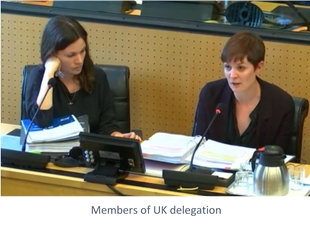 crimes where they consider there is sufficient evidence to charge an individual. The decision on whether to charge and prosecute is one for the director. The director applies the prosecutorial tests that there is a reasonable prospect of conviction and that the prosecution is in the public interest. Although a small number of cases have been referred to the director of service prosecutions for a decision on whether to charge or prosecute, in all cases so far, he has decided that the prosecutorial test have not been met.
crimes where they consider there is sufficient evidence to charge an individual. The decision on whether to charge and prosecute is one for the director. The director applies the prosecutorial tests that there is a reasonable prospect of conviction and that the prosecution is in the public interest. Although a small number of cases have been referred to the director of service prosecutions for a decision on whether to charge or prosecute, in all cases so far, he has decided that the prosecutorial test have not been met.
In response to the question of reports from parliaments, intelligence and security committee into detainee mistreatment and rendition, the UK Delegation declared that in June 2018, the Intelligence and Security Committee published their report on detainee mistreatment and rendition which is publicly available. In November 2018, the UK government published their response to the report which is also publicly available. The Prime Minister made a statement confirming that the UK government continues to give serious consideration to the examination of detainee issues and whether any more lessons can be learned and if so, how.
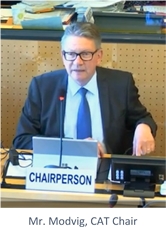 Concluding Observations by the Committee Against Torture
Concluding Observations by the Committee Against Torture
On 17 May 2019, the Committee Against Torture published its concluding observations on the sixth periodic report of the United Kingdom. The Committee urged the UK to ensure accountability for any torture and ill-treatment committed by UK personnel from 2003 until 2009 by establishing independent and public inquiry mechanisms. Similarly, the UK was urged to carry out an inquiry on alleged acts of torture and other ill-treatment of detainees held overseas committed by, at the instigation of or with the consent or acquiescence of British officials.
Extraterritorial effect of the Convention against Torture
The Committee regretted the UK’s persistent position that the Convention is “primarily territorial” and does not have “extraterritorial effect”. In this respect, the UK should take effective measures to prevent acts of torture, not only in its sovereign territory, but also “in any territory under its jurisdiction”, which comprises all areas where the State party exercises, directly or indirectly, in whole or in part, de jure or de facto effective control, including situations where a State party exercises, directly or indirectly, the facto or de jure control over persons in detention.
Accountability for abuses in Iraq
In the paragraphs 32 and 33 of its concluding observations, the Committee noted with concern that while the Iraq Historic Allegations Team received around 3,400 allegations of unlawful killings, torture and ill-treatment, committed by the UK armed forces in Iraq between 2003 and 2009, no prosecutions for war crimes or torture resulted from its investigations, its work ceased in June 2017, and its remaining investigations were transferred to the Service Police, which had closed 1,127 of the 1,280 allegations transferred to it as of 31 December 2018. While the Service Police Legacy Investigation (SPLI) continues to carry out 19 full and 18 limited investigations involving 151 allegations, the Committee remained concerned about reports indicating that cases transferred to SPLI might have been closed “based on an arbitrary and conceptually under inclusive ranking of their severity” (arts. 2, 12-14 and 16).
Recalling its previous recommendation (CAT/C/GBR/CO/5, para. 16), the Committee urged the State party to take all necessary measures to establish responsibility and ensure accountability for any torture and ill-treatment committed by UK personnel in Iraq from 2003 to 2009, specifically by establishing a single, independent, public inquiry to investigate allegations of such conduct. The State party should refrain from enacting legislation that would grant amnesty or pardon where torture is concerned. It should also ensure that all victims of such torture and ill-treatment obtain redress.
Allegations of UK complicity in torture overseas
In the paragraphs 34 and 35 of its concluding observations, the Committee further regretted the State party’s failure to establish an independent judge-led inquiry into allegations of torture overseas, including by means of complicity, as a result of the State party’s military interventions in Iraq and Afghanistan, despite previous assurances to the Committee. In this connection, it took note with concern of the findings of the reports on detainee mistreatment and rendition, dated June 2018, of the Intelligence and Security Committee (ISC) of Parliament, following its inquiry into the actions of UK security and intelligence agencies in relation to the handling of detainees overseas and rendition. In addition to the disturbing findings contained in the reports indicating that the State party may have been complicit in cases of torture and ill-treatment, the Committee noted with concern that the ISC’s inquiry was prematurely closed due to lack of access to key evidence, as the UK Government refused to provide access to witnesses from the State party’s intelligence agencies. The Committee also noted the government’s statement of apology of 10 May 2018 to Abdul Hakim Belhaj and Fatima Boudchar (arts. 2, 12–14 and 16).
The Committee reiterated its previous recommendation (CAT/C/GBR/CO/5, para. 15) that the State party establish without further delay an inquiry on alleged acts of torture and other ill-treatment of detainees held overseas committed by, at the instigation of or with the consent or acquiescence of British officials. Such an inquiry should be fully compliant with the State party’s obligations under the Convention. The State party should also ensure that all perpetrators of torture and ill-treatment in the context of the inquiry are duly prosecuted and punished appropriately, and that victims obtainredress.
GICJ Conclusion
In its submission, GICJ concluded that torture is a grave violation of human rights and must be addressed swiftly and decisively. GICJ stressed the need for timely resolution of the allegations of torture against UK military personnel. It has already been more than a decade since most of the torture and abuse took place, and the UK has failed to resolve the issue in all that time. The UK must ensure that the investigation and prosecution of these allegations are given full attention and resources in order to achieve justice for the victims and send a clear message that perpetrators of torture and ill treatment will not enjoy impunity.
GICJ will continue to monitor the implementation of the recommendations addressed by the Committee Against Torture to the UK and to raise the abovementioned issues at the Human Rights Council and before all relevant United Nations bodies. Furthermore, GICJ will persevere in its efforts to keep track of progress made on the ongoing investigation at the International Criminal Court with the aim of delivering justice to the victims of torture in Iraq.
[1] Sir John Chilcot’s Public Statement, 2 July 2016, UK National Archives, https://webarchive.nationalarchives. gov.uk/20171123124608/http://www.iraqinquiry.org.uk/the-inquiry/sir-john-chilcots-public-statement/.
[2] UK Government Demands Secrecy for High-Profile Torture Case, Middle East Eye (8 Mar. 2017), https://www.middleeasteye.net/news/uk-government-demands-secrecy-high-profile-torture-case.
[3] Transcript of Statement by Sir William Gage, Chairman of the Baha Mousa Inquiry, at 5–6 (8 Sept. 2011), https://webarchive.nationalarchives.gov.uk/20120215203921/http://www.bahamousainquiry.org/report/index.htm.
[4] British Troops Breached Geneva Conventions in Iraq, High Court Rules, The Guardian (14 Dec. 2017), https://www.theguardian.com/world/2017/dec/14/british-troops-breached-geneva-conventions-in-iraq-high-court-rules.
[5] The Office of the Prosecutor, International Criminal Court, Report on Preliminary Examination Activities 2018 para. 196 (Dec. 2018).
[6] Id., paras. 205–206.
[7] Sixth Periodic Report Submitted by the United Kingdom of Great Britain and Northern Ireland, para. 222, U.N. Doc. CAT/C/GBR/6 (29 Jan. 2018).
[8] Committee against Torture, Concluding Observations on the Fifth Periodic Report of the United Kingdom of Great Britain and Northern Ireland, para. 16, U.N. Doc. CAT/C/GBR/CO/5 (24 Jun. 2013).
[9] Id. at para. 17.
[10] Id. at para. 16.
humanrights, Geneva, geneva4justice, gicj, Geneva International Centre for Justice, Racial Discrimination, Racism, Iraq, Justice
More reading:
Click here to read Urgent Letters and Appeals on Iraq by GICJ.
GICJ articles on Iraq:




